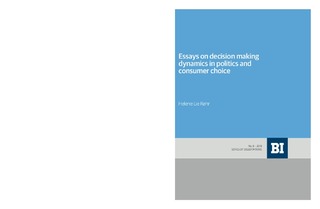Essays on decision making dynamics in politics and consumer choice
Doctoral thesis
Permanent lenke
http://hdl.handle.net/11250/2502551Utgivelsesdato
2018Metadata
Vis full innførselSamlinger
Sammendrag
Individuals’ choices are the foundation in economics; an individual makes the choice that maximizes her utility. Doing nothing or maintaining a previous decision is also a choice—the status quo choice (Samuelson and Zeckhauser, 1988). To explain the mechanisms resulting in status quo behavior, research point at frictions such as search costs and switching costs. In addition, a long list of cognitive biases which result in the status quo choice. Status quo behavior is observed in settings that are relevant for this thesis. Looking first to the political realm, sitting politicians have an increased probability of remaining in their position, that is, they have an incumbency advantage. Evidence of the incumbency advantage in candidate-centered systems are extensive. This thesis shows that incumbency advantages in a party-centered system, stem from the incumbent candidates’ improved list position in the next election. Hence, the parties execute status quo behavior in their nomination process. Moving to the realm of consumer choice, numerous purchase decisions are either very similar or pure replications of past purchase decisions. However, research has shown evidence of consumer inertia implying that consumers replicate past choices, even when close substitutes are less expensive. The last two chapters of this thesis discuss consumer inertia in switching of mobile subscription. First, I discuss switching of subscriptions within a telecom operator, and second, I discuss consumers’ decision to leave their telecom operator. Consumers’ switching behavior following unanticipated price changes, indicates that the market is influenced by consumer inertia.
Består av
Paper 1 of this dissertation (pages 14-42) is not available open access, due to copyright matters.Fiva, J. H., & Røhr, H. L. (2018). Climbing the ranks: incumbency effects in partylist systems. European Economic Review, 101, 142-156. https://doi.org/10.1016/j.euroecorev.2017.09.011
